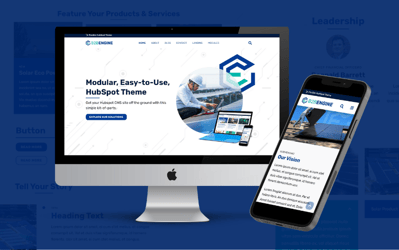Why HubSpot Is a Great Choice for Climate Tech Companies

As governments, institutions and businesses around the world increasingly turn their attention to combating climate change, the rise of climate tech companies has been nothing short of remarkable.
According to Tech Nation, there are at least 45,000 climate tech companies globally, with new ones popping up all the time. As PwC observed in their 2022 State of Climate Tech report, investment in climate tech has stayed strong despite recent declines in VC funding, and with recent federal policies such as the Inflation Reduction Act, it’s likely to remain so.
These innovative companies are at the forefront of developing solutions to mitigate challenges ranging from renewable energy to sustainable agriculture. However, the complex landscape of climate tech companies presents challenges of its own.
Facing lightning-fast growth, protracted B2B sales cycles, and a market that seems to evolve as swiftly as the climate itself, companies need the right tools to match their goals. Software such as HubSpot, an all-in-one inbound marketing and sales platform, can help.
6 climate tech and cleantech challenges that HubSpot helps solve
From managing rapid expansion to nurturing relationships through long sales cycles to staying agile in the face of a dynamic market, HubSpot offers a comprehensive suite of features that empower climate tech companies to overcome key challenges and pursue their goals.
1. Siloed sales and marketing
Overcoming silos, particularly between sales and marketing, is a challenge for organizations of all types. You’ve probably heard why: according to research from LinkedIn, companies with well-aligned sales and marketing teams experience 36% higher customer retention and are 24% faster at growing revenue. Simply put, when sales and marketing don’t work closely together, the result is wasted time and effort and less effective results.
Because climate tech companies are emerging and growing at such a rapid pace, they are particularly vulnerable to missing the dedicated upfront work it takes to effectively integrate sales and marketing teams.
In a fast-paced environment where collaboration is paramount, siloed teams can hinder growth and lead to missed opportunities. HubSpot acts as a unifying force, seamlessly integrating marketing and sales functions under one roof.
The HubSpot CRM provides a single source of truth about leads and contacts, their position in the sales funnel, what communications they’ve received and actions they’ve taken (such as downloading a piece of content), notes from sales calls, and more.
Salespeople and marketers can more easily visualize how their actions work together to form one coherent process, and share information in an intuitive interface, while also accessing specialized tools and workflows tailored to their particular responsibilities within the sales pipeline.
While breaking down silos requires more than just software (it also needs guidance from leadership, aligning goals and visions, and opening up channels of communication), using tools such as HubSpot can help by keeping the different departments engaged with one another and on the same page.
2. Inefficient internal processes
Climate tech companies are often grappling with suboptimal internal processes, a byproduct of the rapid pace of innovation and frequent adjustments to meet ever-changing market demands.
These inefficiencies can have a devastating effect on lead generation, customer outreach, sales, and marketing, hampering the overall potential for growth.
But you don’t need to reinvent the wheel here: Industry-standard sales and marketing processes work just as well for climate tech as other intensive B2B industries. Time-consuming manual tasks such as email sequences, social media cross-posting, and prospect outreach can be automated with HubSpot workflows.
These automated processes can seamlessly nurture leads over the extended B2B sales cycles, ensuring no potential client falls through the cracks, and execute personalized content delivery at different stages of the sales cycle, catering to client preferences and behaviors.
HubSpot also provides extensive learning materials, such as their Academy, to help you understand the strategic reasoning and best practices behind implementing these workflows.
By adopting HubSpot's innovative automation, climate tech companies can revamp their internal workflows, eliminating bottlenecks and unleashing a new era of efficiency that aligns with the industry's relentless pace.
3. Outdated outreach tactics
For climate tech companies, the challenge of staying relevant in a rapidly changing market landscape demands a departure from outdated outreach tactics.
Traditional methods of cold calling and generic email blasts often fall flat in a sector that thrives on innovation and personalized solutions.
Marketing is often broken up into two modes: inbound and outbound. Whereas outbound marketing involves proactively reaching out to consumers to get them interested in your product, inbound marketing attracts customers, bringing them to you via valuable content and tailored experiences.
HubSpot popularized inbound marketing as a concept (their annual user event is called Inbound), and their platform is specifically designed for running a successful inbound program easily, as created by some of its greatest practitioners.
That doesn’t mean outbound isn’t useful. You need both to maximize your sales, but you also need to do outbound right. Wasting time on outreach to the wrong prospects or using the wrong message is a big drain on your limited resources. Identifying your target audience and tailoring your message to them is critical.
HubSpot’s CRM allows for the creation of detailed customer profiles, enabling companies to understand their audience on a granular level. Leveraging this, businesses can craft tailored messages and content that resonate with individual pain points and aspirations.
And HubSpot's marketing automation tools enable companies to deliver these messages at the right time, using the preferred communication channels of their prospects.
When your prospects haven’t opted in to your marketing communications, you can still reach out to them using HubSpot Sales Hub, which features email templates, email tracking, document management, call tracking, sales automation, conversational intelligence features, and more.
Your data is automatically connected on the platform, enabling you to easily (and powerfully) track your entire customer journey, no matter where they originated, from first website visit or BDR outreach to closed deal and beyond.
4. Complicated sales funnels
Complicated sales funnels are a common problem for new technology companies, and climate tech in particular. You may be targeting large institutions, governments, enterprise clients, or Big Tech companies, all with a long sales cycle stretching across months or even years.
Closing deals may require a lot of approvals and contract work. You may offer custom solutions or white glove service, or have multiple products and attempt to do a ‘land and expand’ with a smaller offering.
You may have different personas with different reasons for buying. All of these make for a complex sales funnel whose management is a formidable task in itself.
Making your sales funnel as straightforward and efficient as possible is crucial for the sanity of your salespeople and marketers. A hypercompetitive market and long sales cycle means you don’t want to miss any prospects and you need to cultivate the right relationships — while also making sure they’re qualified buyers.
Understanding your conversion funnel is essential in order to engage leads, answer questions and provide the right information, and address any concerns from potential buyers. It’s also ideal to organize leads into categories and create customer touchpoints that entice each group to convert and move further down the funnel.
This is where HubSpot's prowess shines, providing climate tech companies with a great compass for navigating complexity. HubSpot's CRM not only centralizes critical customer information, it also offers a holistic view of where each lead stands within the sales funnel.
Automation workflows can be designed to nurture leads with precision, guiding them seamlessly from awareness to consideration and decision stages.
You can automate lead scoring, so leads are moved down the funnel automatically based on their actions, ensuring they are met with the appropriate content and outreach for their stage. HubSpot ensures that no lead is lost in the labyrinth of a long sales cycle, ultimately shortening conversion times and enhancing the efficiency of the process.
5. Resource constraints
A recent study by Endeavor Insight and HSBC found that the top challenges for climate tech founders are closing persistent funding gaps due to access to growth-stage capital and sourcing talent.
These put very real resource constraints on climate tech startups who are running lean, as well as larger companies outgrowing the startup phase who need to maintain growth and momentum in a higher interest rate environment.
Leveraging tools like HubSpot can give your sales and marketing the efficiency they need to punch above their weight and compensate for limited resources. Even small teams can benefit from automating sales and marketing workflows, while maintaining organized lead data, inbound marketing, and outbound outreach processes.
6. Lack of data and analytics
While sales cycles can be long for climate tech marketers, the amount of time they have to get results is not. They need to know what’s working and what isn’t as quickly as possible, and adjust accordingly. Data and analytics provide the feedback marketers need to adapt their efforts.
Too often, marketers either have access to not enough data or way too much located in disparate systems. HubSpot’s marketing analytics provide comprehensive yet easy-to-understand dashboards so teams can see how marketing interactions drive revenue, track site analytics, and get detailed reports for all marketing channels.
Because HubSpot hosts the website, executes sequences, and stores contact data, it can connect these all together for a comprehensive overview. You can analyze website performance metrics such as traffic sources, sessions, and conversion rates and understand how users are interacting with your site.
You can track content performance and see detailed reports for every marketing asset, from your website to emails, blog posts, social media, and more. And you can use multi-touch revenue attribution to map how marketing touchpoints work together to drive revenue.
Within ten seconds, you can see how many visitors, leads, and customers you got from email, social, paid search, SEO, and other campaigns, and track the conversion rate to find opportunities for improvement. Analytics are built into everything you do in HubSpot, right out of the box.
Want help with HubSpot for your climate tech marketing?
HubSpot’s CRM platform has all the tools and integrations you need for marketing, sales, content management, operations, and customer service. Each product in the platform is powerful alone, but they’re even better together. For Climate Tech companies, it gives you a true competitive edge.
If you’re interested in HubSpot but not sure how to start, New Perspective can help. As a certified HubSpot Platinum Partner, we’re one of the world’s leading HubSpot agencies, and we have a long track record of measurable and sustained inbound lead generation results for our clients.
Our team collectively boasts over 45 HubSpot certifications spanning the full suite of their software stack. If you’re just getting started, we’re also a HubSpot Onboarding accredited agency — and we know how to get the best out of this juggernaut of a platform.
Our team is also passionate about sustainability, climate tech, and the cleantech marketing space. We’ve worked with numerous cleantech companies, and we understand the unique challenges and opportunities you face. Don’t hesitate to reach out.





